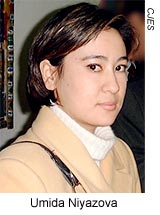New York, April 12, 2007—The Committee to Protect Journalists is alarmed by a third charge against a Tashkent-based independent journalist and human rights researcher, who has been imprisoned since January 22.
Umida Niyazova, 32, covered politics and human rights in Uzbekistan for the Central Asia news Web site Oasis, a project of the Moscow-based media watchdog Center for Journalism in Extreme Situations. She also contributed to non-governmental organizations Human Rights Watch, Freedom House, and Internews Network, according to CPJ sources.
Niyazova remains in a Tashkent prison awaiting trial on charges of “illegal border crossing” and “smuggling of subversive literature.” Each charge carries up to 10 years in prison. On Friday, prosecutors added another charge, which carries up to 15 years in prison and property confiscation: distributing materials that threaten national security with the use of foreign financial aid.
“We are deeply concerned about the welfare of our colleague Umida Niyazova,” said CPJ Executive Director Joel Simon. “We call on Uzbek authorities, who continue to hold her on another baseless charge, to free her at once.”
Prosecutors used Western Union transaction records wired to Niyazova and her family as evidence that the journalist had distributed materials that threatened national security with foreign financial assistance, the Moscow-based Central Asia news Web site Ferghana reported.
When Niyazova’s sister Shafoat visited the journalist in prison to bring clothes in February, she told the independent news Web site Uznews that Umida “had a blank look, she lost weight and her eyes [were swollen].” According to CPJ sources close to Umida, the journalist undergoes daily interrogations that last up to 15 hours and sleeps only 3-4 hours per night. A source told CPJ that loud music is constantly played when Umida is in her cell.
Niyazova has been in custody since she was arrested by Tashkent authorities as she crossed the border from Kyrgyzstan into Uzbekistan without a passport after police had confiscated her passport earlier. Authorities held her incommunicado for four days, and sent her to Tashkent on January 26 where she has been kept in a pre-trial detention center ever since, the Moscow-based press freedom group Center for Journalism in Extreme Situations reported.
Following the Andijan bloodshed, Karimov and his regime cracked down on independent journalists, driving independent reporters into exile, putting scores of government critics in jail, and purging the country of alternative news outlets, CPJ research shows.
